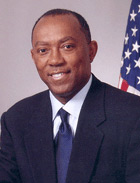Here’s a Q&A with our new Mayor that looks back on the campaign that just wrapped up.
Q: Economically, electorally, this is a divided city. You campaigned on a platform of bringing people together. How do you overcome that split now that you’ve been elected mayor?
A: When I woke up this morning, the campaign was over. So it doesn’t matter how people voted or who voted where, for whom. The point is, as I look forward to January, I’m the mayor for the city of Houston. And for me, it doesn’t matter whether it was 75/25 margin, 51/49. People want better streets. People want a safe city. Those things are kind of universal. People want a city where you’re operating within your means. And that’s neither Democrat nor Republican, rich or poor. At this point in time, I don’t see division.
Q: You won City Council districts B, D, H, I and K, all of which are majority-minority and largely economically disadvantaged. In the context of trying to bring people together, which was a pillar of your campaign, is that a concern?
A: No, not at all. It was a campaign. Oftentimes people make their decision based on a multiplicity of factors. I respect people’s right to make their decisions. It doesn’t matter that in a competitive political race when there’s so much political spin being put out there that people will gravitate to those candidates that they most identify with. I got that. I understand that. I’ve been in this business for a while. But now, if I govern with that in mind, I make a serious mistake. But if I wipe the slate clean, and the question is, ‘Sylvester, can I wipe the slate clean? Do I not see the numbers or where people voted, and govern with the best interest of the city of Houston in mind?’ If I can’t do it, I make a mistake and the division continues. If I can do it, then those who may have voted for someone else will end up being supportive.
Q: You have about three weeks before you take office. What’s on your agenda between now and then?
A: To assemble a pretty good transition team. There are lot of smart, talented individuals in the city who can help in making the transition from one administration to another, and I’m in the process of doing that right now. It may take a few days to a week to fully put that together.
Q: What are your first steps once you do take office? Roads and pensions were big components of the campaign, among other concerns. What’s top of the agenda?
A: What’s important is to make sure, for example, that people in Houston when they turn on the light switch, the lights come on, the buses run on time, you’re operating within your financial means. Infrastructure, streets, roads, making sure that we have a balanced budget at the end of June, public safety. Those are the fundamentals. We get the fundamentals right, then I think in large part people will give me a high mark.
Just a reminder, those divisions would still be there if the vote had gone the other way. Elections are like that. Putting that aside, I’ll be very interested in seeing who is on Mayor-elect Turner’s transition team. I suspect this transition will be a bit smoother than the other one we could have had would have been.
The Chron would also like to remind us that the road ahead will be bumpy.
Houston’s new mayor, Sylvester Turner, will have plenty of opportunities to leave his mark on the city. It just won’t be easy, and it certainly will not be immediate.
The city’s new chief executive will face crumbling roads, shaky finances and a shorthanded police department, with no quick fix, and some of those problems will require help from the Texas Legislature or a two-year wait to amend the city charter. With those policy problems looming, the next mayor will have to acclimate to the culture of City Hall, learning to lead a City Council with at least four rookie members and still respond to day-to-day demands from residents.
“A new mayor is going to arrive in office wanting to have a positive effect,” said Mark Jones, a Rice University political scientist. “But instead of providing services, they may need to cut spending on police and other services. Even the status quo is going to be difficult to maintain in the current budget climate.”
Houston faces deficits as far as the projections reach, starting with a $126 million gap between revenues and expenses that must be closed in the budget to be adopted in June. A slump in oil prices and falling sales tax revenues won’t help that.
Cut hours at the library, quit mowing the park or close the pool in the wrong civic leader’s neighborhood, and the new boss barely will have figured out how to work the council chamber microphone before making potentially lasting enemies.
I’m sure you know the drill by now. We went through something like it six years ago. Whatever one’s opinion of the new term limits law is, not having to run again until 2019 gives Turner more room to get things going the way he wants them to go – and to hope for the local economy to turn around – than Mayor Parker had. She might well have been in trouble if she’d faced a serious challenger in 2011. Sylvester Turner may or may not face a serious challenger in his next race, but at least he has four years to prepare for it, not just two.

